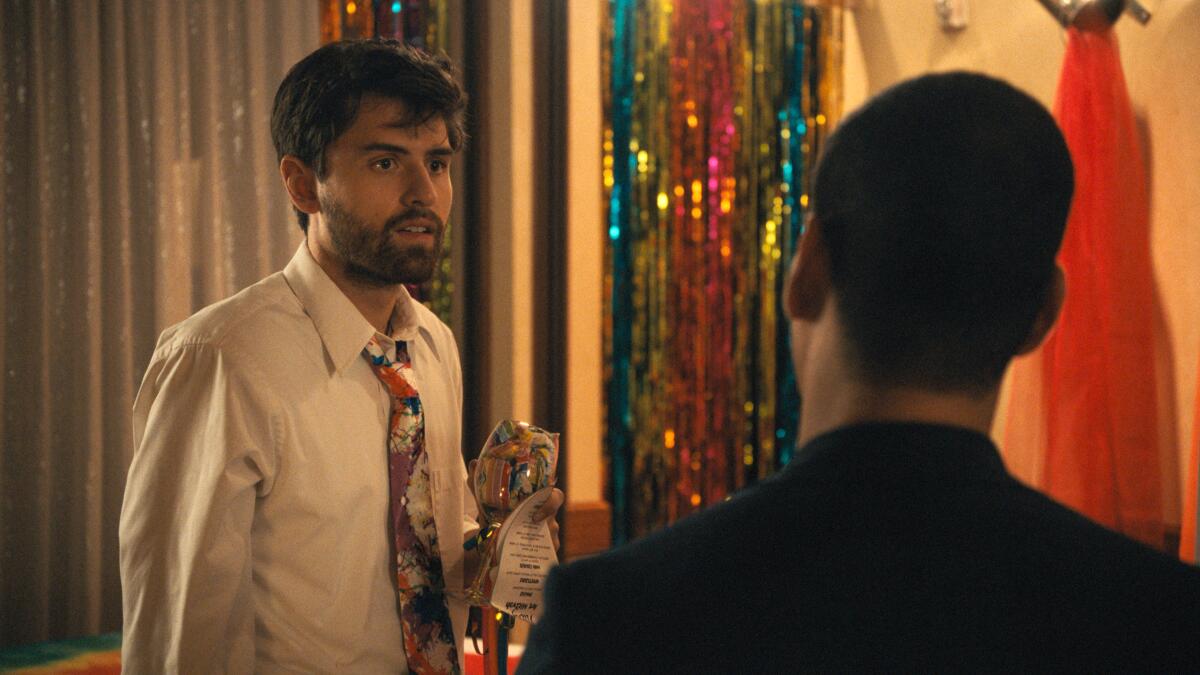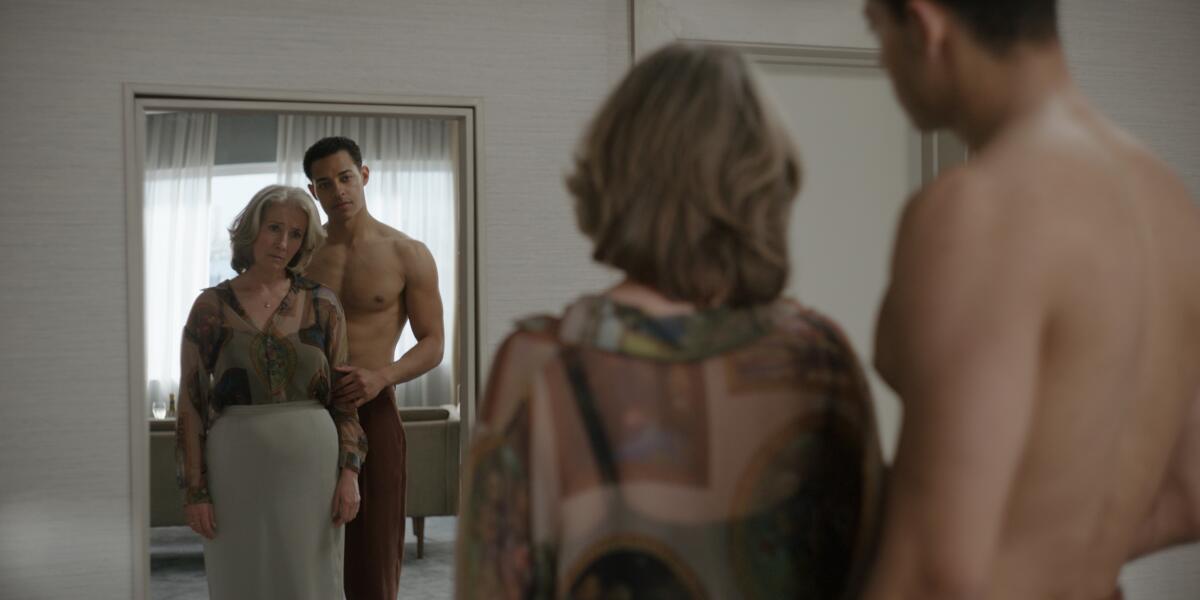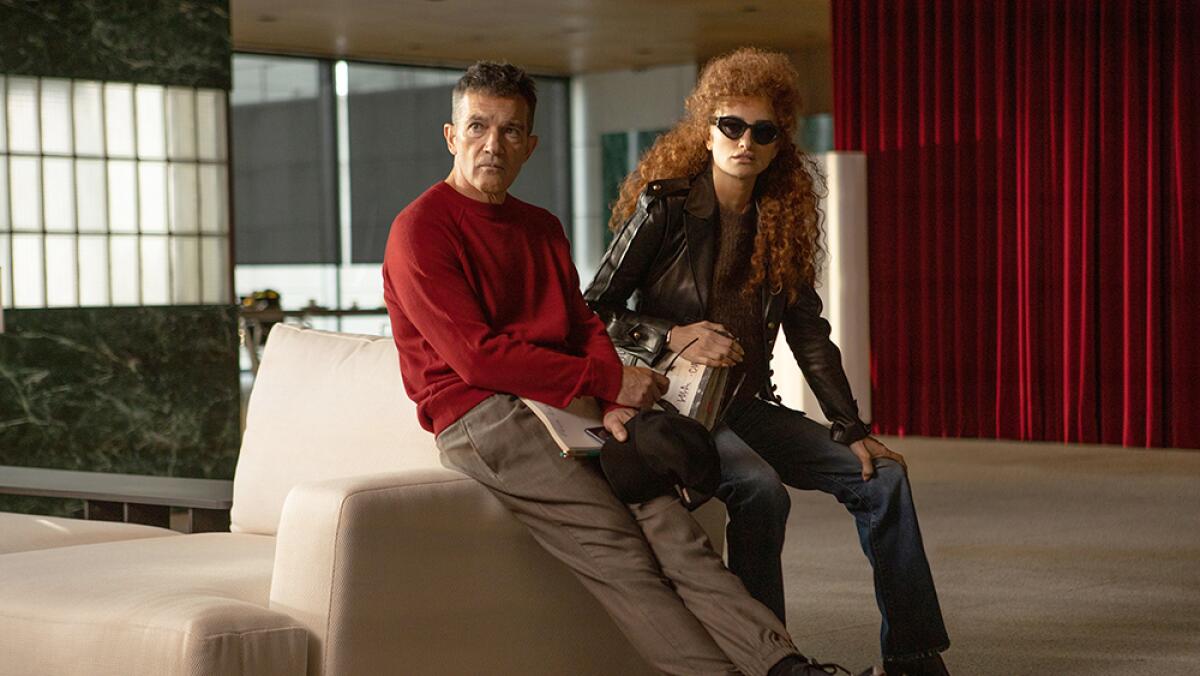Why Cooper Raiff’s ‘Cha Cha Real Smooth’ is not a dramedy

- Share via
Hello! I’m Mark Olsen. Welcome to another edition of your regular field guide to a world of Only Good Movies.
Only good movies
Get the Indie Focus newsletter, Mark Olsen's weekly guide to the world of cinema.
You may occasionally receive promotional content from the Los Angeles Times.
James Hong’s prolific success. Jen Yamato recently profiled the actor, known for roles in films such as “Blade Runner” and “Big Trouble in Little China” (and on TV’s “Seinfeld”), who at 93 has seen one of the biggest successes of his career with the recent “Everything Everywhere All at Once.”
On what has driven his performances all these years, Hong said, “It’s easy for me to create a character that wants love. Well, I think that’s true with everybody, whether it’s men or women. That search for love — a perfect love — always gets people into trouble. That is the basis of human nature! When you stop searching, you’re dead.”
A tribute to Dolly Hall at the New Beverly. Next week, the theater will host a tribute to producer Hall, a force of ’90s independent cinema. On Monday, a pair of rare prints from the UCLA Film and Television Archive will show, 1995’s “The Incredibly True Adventures of Two Girls in Love” and 1997’s “All Over Me.” Then on Tuesday, there will be showings of “High Art” and “54,” both from 1998. Hall and other collaborators are scheduled to be at the screenings.
Mubi goes to the movies. For his Wide Shot newsletter this week Ryan Faughnder took a look at Mubi, the art-house subscription streaming service that is launching a program that will allow members to see select movies in specific theaters at no additional charge.
“Oftentimes, some of the best things don’t have huge marketing budgets behind them,” said C. Mason Wells, Mubi’s director of U.S. distribution. “These are movies that maybe you haven’t heard of before. But if you trust us and our curatorial vision, you’re going to be surprised more often than not by what we offer.”
Enjoying this newsletter? Consider subscribing to the Los Angeles Times
Your support helps us deliver the news that matters most. Become a subscriber.
‘Cha Cha Real Smooth’
Written and directed by Cooper Raiff, “Cha Cha Real Smooth” premiered earlier this year at the Sundance Film Festival, where it won the audience award in the U.S. dramatic competition and was acquired in the biggest deal of the festival for $15 million. In the film, Raiff stars as Andrew, a recent college graduate who is a bit aimless as he tries to find his way. Through his job as a bar mitzvah “party starter,” Andrew befriends Domino (Dakota Johnson), a young mother, and her teenage daughter, Lola (Vanessa Burghardt), who has autism. The film is in theaters and streaming on Apple TV+.
I spoke to Raiff and Burghardt for a story that will be publishing soon. At age 25, Raiff has an emerging bittersweet style that’s evident in the two features he’s made, films that he’d rather not refer to as “dramedies.” “I think the reason why it feels so, like, ‘ugh’ when I hear ‘dramedy’ — because that’s not a bad word, but I always think it’s a bad word — [is] it feels split down the middle. I think dramedies have a lot of situational comedy. I’ve never, ever done anything situational. It’s always, always coming from character. I’ve never written a joke in my life. I don’t know how to write a joke. All of the funny moments come from something really deep inside of a character.”
For The Times, Jessica Kiang wrote, “The film is a charmer, and Raiff, against the significant odds he sets himself, a remarkably winning presence — imagine a Zach Braff type whom you don’t necessarily want to see fall in a moat. As the movie dances right up to the conventions of this well-worn genre, then deftly slides (To the left! To the right!) to avoid them, you might just find yourself clapping along in spite of it all being terminally uncool. Uncool can be a lot of fun.”
For the New York Times, Manohla Dargis came to an altogether different conclusion, writing, “Raiff also wrote and helped produce ‘Cha Cha Real Smooth,’ so he is clearly ambitious. But if he has something to say about life, it’s not apparent from this movie. It’s derivative and unpersuasive, and as pandering as any big studio soft sell; it’s filled with stylistic clichés (hovering camerawork, mewling songs), cardboard characters, silly dialogue and absurd narrative contrivances, starting with Domino, a trite male fantasy who’s only a vessel for Andrew’s narcissism. Raiff shrewdly complicates this cliché a touch, though, again, only to exploit it. Their relationship never makes sense; but, then, neither does most of the movie.”
For IndieWire, David Ehrlich wrote, “If the whole thing still feels awfully slight even in the context of a Sundance movie — so unforced that you half expect it to fall out of orbit at any second — it’s nice to see a young filmmaker bring the stars to him instead of straining to reach their level. This is a story about two people lost in the same limbo at very different points in their lives (or four people, if you count David and Lola), and it’s made all the more affecting because Raiff has the patience and maturity to let his characters map their own way forward. Doing that is his gift to Andrew and Domino; it’s what finally might allow them to do something for themselves.”

‘Good Luck to You, Leo Grande’
Directed by Sophie Hyde from a screenplay by Katy Brand, “Good Luck to You, Leo Grande” plays out in a nondescript hotel room. A widow, Nancy Stokes (Emma Thompson), has hired male sex worker Leo Grande (Daryl McCormack) for a number of sessions in order to experience all that she did not in her staid marriage. The film is streaming on Hulu.
For The Times, Justin Chang wrote, “‘Good Luck to You, Leo Grande’ thus achieves both the intimacy of a chamber piece and the directness of a public service announcement, one aimed at promoting sex/body positivity and debunking retrograde attitudes about women’s pleasure and the nature of sex work. If that makes it sound stagy and even didactic — you could certainly imagine it working well as a play — well, the message is a worthy one, and all PSAs should be this pleasurable. At times you can see the gears of Brand’s script grinding away, the carefully engineered pivots from one point or revelation to the next. (The fourth act, in particular, leaves no point unaddressed.) But Hyde stages it all with an unfussy elegance that serves the material, and any lingering creakiness is dispelled by Thompson and McCormack, who always seem to be playing people rather than ideological mouthpieces.”
Sonaiya Kelley spoke to Hyde and McCormack for a story that will be publishing soon. As Thompson and McCormack rehearsed for scenes that required them to be nude, Hyde took off her clothes too. She explained: “As a director, you do whatever it takes [to make] the actors feel more comfortable. It’s very powerful to have that moment of vulnerability with other people. A closeness between us was built over the whole week, but that took it to a new level. So by the time we stepped onto set, we felt like we knew what we wanted to tell and could get there.”
For the Washington Post, Ann Hornaday wrote, “Thompson fans — and really, by now, who isn’t? — will already be sold on ‘Good Luck to You, Leo Grande’ by premise alone: Nancy is a character the actress feels born to inhabit with her signature blend of vulnerability and pragmatism. First as a dutiful daughter, then as a wife, mother and teacher, Nancy has repressed her own desires her entire life; in less capable hands, she’d come off as pinched or pathetic. But Thompson imbues her with flint and knowing humor: She’s self-aware enough to know how ridiculous her predicament is but dignified enough not to be ridiculous herself.”
For the AP, Lindsey Bahr wrote, “Female desire is not a topic that gets a lot of space in mainstream Hollywood movies. And the desire of women north of 45? Well, that’s been almost exclusively the province of Nancy Meyers, Meryl Streep and Diane Keaton. There have been others, sure, but it’s often either played for humor or scrubbed and sanitized of anything remotely carnal. Usually it’s some horrifyingly infantilized combination of both. It’s as though someone decided that audiences couldn’t possibly bear to watch a woman of menopause age acting or even feeling sexual and few have dared to challenge that notion. That’s all to say that it is a small miracle that ‘Good Luck to You, Leo Grande,’ a smart, nuanced and adamantly sex-positive film about a 55-year-old woman, exists.”
For Vanity Fair, Richard Lawson wrote, “‘Good Luck to You, Leo Grande’ is a movie about time and aging as much it is about sex, a soft encouragement to those in the audience who, like Nancy, feel too committed — or condemned — to the limits of their life to seek out something new. … There will no doubt be some people who see the film and find its power structure, and its arguments, too lopsided, too blithe about Leo and all he’s carried with him into these trysts. On my second viewing, though, I was most struck by how generous ‘Leo Grande’ is, how open to discourse and difference. It’s a movie about private encounters that just may be a public good: sex ed, or life ed, for grownups.”

‘Official Competition’
Directed by Gastón Duprat and Mariano Cohn, “Official Competition” (also known by its Spanish-language title, “Competencia Oficial”) features Penélope Cruz and Antonio Banderas in a revealing, comedic mode. An aging industrialist (José Luis Gómez) finances a film as a tribute to himself, hiring provocateur director Lola Cuevas (Cruz) to direct a superficial movie star, Félix Rivero (Banderas), along with a tormented actor’s actor, Iván Torres (Oscar Martínez). The film is in theaters.
For The Times, Sarah-Tai Black called the film “a welcome satire that makes work of biting meta-commentary and the immediacy of self-reflexive critique” adding, “While the rehearsal process sets the stage for [the actors’] differences to shift from self-aggrandizing philosophical discussions into full-on conflict, ‘Official Competition’ is more concerned with a deeper examination of the role of ego and power dynamics in artmaking.”
Sergio Burstein spoke to Cruz and Banderas for a story publishing soon. Banderas told Sergio, “I think the movie is really talking about the ridiculousness of being human and the ability we have to easily become what we criticize.”
For the New York Times, A.O. Scott wrote, “In the end, this is a one-joke movie — a shaggy-dog meta-narrative — but it’s not a bad joke. The production seems to have been undertaken during a time of relatively strict pandemic restrictions, evident in the cavernous sets, the sparsely populated scenes and the social distancing among the actors. The austerity has its advantages: a busier behind-the-scenes comedy might not have been able to offer such a close study of the actors at work, or such a dry and rigorous anatomy of what they do.”
For the Hollywood Reporter, Lovia Gyarkye wrote, “For Duprat and Cohn, pondering and poking fun at the artistic process is familiar terrain. Their previous films — ‘The Man Next Door’ and ‘The Distinguishd Citizen’ — raised questions about the tensions between high and popular culture, the costs of success and the broad ethical quandaries those of us delusional enough to commit to a creative life face. They deal with those themes in ‘Competencia Oficial,’ but this film’s particular focus, and one that makes it especially absorbing, is the lengths to which actors go to deliver emotional and moving performances. … Despite its commitment to biting humor and acerbic analysis, ‘Competencia Oficial’ is, at its heart, a celebration of artists and their process.”

Only good movies
Get the Indie Focus newsletter, Mark Olsen's weekly guide to the world of cinema.
You may occasionally receive promotional content from the Los Angeles Times.




